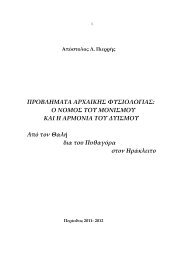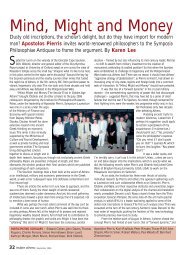10separate <strong>the</strong>m. Basically, as Aristotle says [20], it was this: if <strong>the</strong> very nature <strong>of</strong> <strong>the</strong>Good c<strong>on</strong>sists in <strong>the</strong> One, <strong>the</strong>n <strong>the</strong> principle opposite to <strong>the</strong> One, namely <strong>the</strong>Multiplicity, must be <strong>the</strong> Evil; but Speusippus denied that <strong>the</strong>re can be evil, indeed<strong>the</strong> Evil, in <strong>the</strong> absolutely first principles. So he made <strong>the</strong> Good and <strong>the</strong> Evil to lie at<strong>the</strong> completi<strong>on</strong> <strong>of</strong> <strong>the</strong> derivati<strong>on</strong> <strong>of</strong> reality ra<strong>the</strong>r than at <strong>the</strong> beginning (like in <strong>the</strong>fully developed animal ra<strong>the</strong>r than at <strong>the</strong> seed and sperm) – to use <strong>the</strong> metaphorSpeusippus himself may have employed [21].We know, <strong>of</strong> course, from Aristotle (and Theophrastus ’ little metaphysicaltract), even if we could not see it already right in Plato’s dialogues, that ascending t<strong>of</strong>irst principles from <strong>the</strong> given via <strong>the</strong> presuppos iti<strong>on</strong>-ladder, and descending from<strong>the</strong>m in a derivati<strong>on</strong> attempt which aims at covering all reality and locatingeverything real at its appropriate place in <strong>the</strong> total Order <strong>of</strong> <strong>the</strong> Universe <strong>of</strong>Subsistence in general – that <strong>the</strong>se procedures were <strong>the</strong> preoccupat i<strong>on</strong> <strong>of</strong> <strong>the</strong> olderAcademy and <strong>of</strong> c<strong>on</strong>temporaneous Pythagorean circles. But how is this specificallyc<strong>on</strong>nected with our particular passage in D.?In fact <strong>the</strong>re were those, who denied any direct c<strong>on</strong>necti<strong>on</strong>, and accused D. <strong>of</strong>misunderstanding. Admirably enough <strong>the</strong>y even pointed at a passage in Aristotle,which, <strong>the</strong>y claimed, was misunderstood by D. [22]. The passage is in Met. N.1087b.25-33 (esp. b32, see also N. 1087b4-9), where admittedly <strong>the</strong> clause ἔσται γὰρ τὸ ἓν ὀλίγον matches well, in all externals, D.’s clause: οὐ γὰρ ἓν ὣς ἐλάχιστον.But in fact we have here just that kind <strong>of</strong> superficial interpretati<strong>on</strong> which marsso much in modern attempts at understanding ancient philosophy in general, andGreek Metaphysics in particular, and most especially Neoplat<strong>on</strong>ism. To see this clearlyin <strong>the</strong> present instance <strong>on</strong>e should firstly notice <strong>the</strong> extreme frivolity <strong>of</strong> Aristotle ’spoint here [23]. The argument is this: Some philosophers claim that a pair <strong>of</strong>c<strong>on</strong>traries ( ἐνάντια) are <strong>the</strong> ultimate principles <strong>of</strong> all reality. Som e (notablySpeusippus) maintain that this fundamental pair is <strong>the</strong> One and <strong>the</strong> πλῆθος. But <strong>the</strong>c<strong>on</strong>trary to Many is <strong>the</strong> Few (drawing <strong>on</strong> <strong>the</strong> ordinary-language oppositi<strong>on</strong> between<strong>the</strong> few and <strong>the</strong> many). Hence <strong>the</strong>ir One must be <strong>the</strong> Few. As if <strong>on</strong>e who wouldpropound <strong>the</strong> view c<strong>on</strong>cerning <strong>the</strong> ultimate nature <strong>of</strong> <strong>the</strong> c<strong>on</strong>trariety between Oneand Πλῆθος, could possibly mean by Πλῆθος <strong>the</strong> Many, instead <strong>of</strong> <strong>the</strong> obviouslyintended Multiplicity, whe<strong>the</strong>r large or small.
11No philosopher could seriously be taken in by such an argument, nor be misledby it. Least <strong>of</strong> all a Neoplat<strong>on</strong>ist [24], and less than least D. himself.It might seem presumptuous to reject an explanati<strong>on</strong> (however futile) <strong>of</strong> whatD. is here referring to, without <strong>of</strong>fering ano<strong>the</strong>r <strong>on</strong>e in its place. But I do not thi nkthat we should at all cost strive to pinpoint <strong>the</strong> sources <strong>of</strong> a testim<strong>on</strong>y like <strong>the</strong> <strong>on</strong>e wemeet here in D. To insist immoderately <strong>on</strong> this is <strong>the</strong> proximate cause <strong>of</strong> muchsuperficiality which has found its way into many a historical and interpretativeattempt. We may just be unable to reach a definite soluti<strong>on</strong> in some cases; crucialevidence may be lacking to us. In view <strong>of</strong> <strong>the</strong> hideous lacunae in <strong>the</strong> transmittedpicture <strong>of</strong> ancient philosophy under which we operate, it needs no extreme modestyto discard supe rficialities while at <strong>the</strong> same time c<strong>on</strong>fessing inability to reachdefinitive c<strong>on</strong>clusi<strong>on</strong>s.Happily though, in our case we need not have recourse to such generalremarks. For it can be shown that D. had in mind something immeasurably moreimportant than a misunderstanding <strong>of</strong> a frivolous argument ad hominem.Speusippus, we saw, distinguished and separated <strong>the</strong> One and <strong>the</strong> Good,c<strong>on</strong>sidering <strong>the</strong> former as first principle, <strong>the</strong> latter as final outcome in <strong>the</strong> derivati<strong>on</strong>or c<strong>on</strong>structi<strong>on</strong> <strong>of</strong> <strong>the</strong> totality <strong>of</strong> reality. No w Good implies perfecti<strong>on</strong>; and ifperfecti<strong>on</strong> appears or presents itself at <strong>the</strong> very last stage <strong>of</strong> <strong>the</strong> said c<strong>on</strong>structi<strong>on</strong> <strong>of</strong>reality (as <strong>the</strong> crowning achievement <strong>of</strong> <strong>the</strong> process <strong>of</strong> producti<strong>on</strong>, much as <strong>the</strong>perfected animal stands at <strong>the</strong> very end <strong>of</strong> <strong>the</strong> line <strong>of</strong> development whose firstinchoate beginning is given with <strong>the</strong> seed), <strong>the</strong>n <strong>the</strong> fur<strong>the</strong>r we are removed fromthat final stage <strong>the</strong> less perfect is <strong>the</strong> state <strong>of</strong> affairs in which we are. In this way firstprinciples must be imperfect par excellence [25].But how are we to c<strong>on</strong>ceive that imperfecti<strong>on</strong> <strong>of</strong> <strong>the</strong> first principles accordingto Speusippus? We have a valuable hint from Aristotle. In Met. N.1092a11-15 [26],he says in so many words that for some people (namely Speusippus and (some <strong>of</strong>?)<strong>the</strong> Pythagoreans) <strong>the</strong> first principles are so incomplete and imperfect ( ἀτελεῖς) that<strong>the</strong> One (<strong>on</strong>e <strong>of</strong> <strong>the</strong> Ultimate Principles) is not even ὄν τι – it is not a being, <strong>on</strong>eam<strong>on</strong>g <strong>the</strong> beings [27].Perhaps <strong>the</strong>n we can amplify <strong>the</strong> Aristotelian hint [28]. Perhaps for Speusippus(or, at least, for a certain current interpretati<strong>on</strong> <strong>of</strong> Speusippus ’ system) <strong>the</strong> prior hasnothing <strong>of</strong> <strong>the</strong> posterior which follows up<strong>on</strong> it, indeed which is derived from, or
- Page 2 and 3: 2GENERAL REMARKThe first section is
- Page 4 and 5: 4Four reasons are, in aporematic fa
- Page 6 and 7: 6ὐθύς, i.e. without any prior
- Page 8 and 9: 8ἀμερές). Thus nothing is mi
- Page 12 and 13: 12produced by, it; the principle in
- Page 14 and 15: 14the fashion of its one-ness, i.e.
- Page 16 and 17: 16[36] it may be. Now the def inite
- Page 18 and 19: 18found, and (there found) in accor
- Page 20 and 21: 20in its elf (apart from the orderi
- Page 22 and 23: 22something whose immediate product
- Page 24 and 25: 24clearer, as the system is further
- Page 26 and 27: 26ἡνωμένον, which generate
- Page 28 and 29: 28We find in this here a good insta
- Page 30 and 31: 30fully see his point, and to take,
- Page 32 and 33: 32NOTES[1] Not quite “given” th
- Page 34 and 35: 34forget that, for the time being,
- Page 36 and 37: 36[28] The interpretation given to
- Page 38 and 39: 38[39] It can be shown that there c
- Page 40 and 41: 40being immersed in it, handling it










